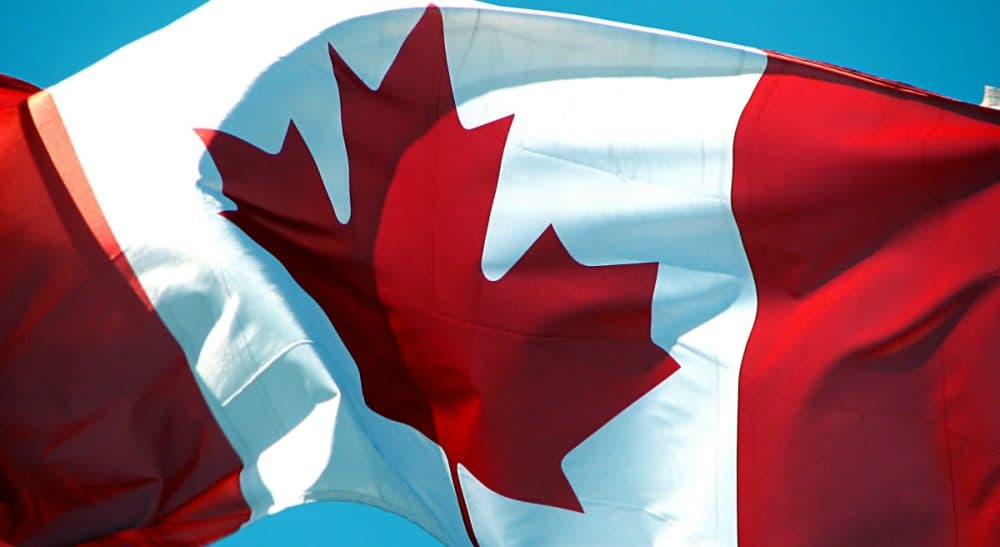Advertisement
Bernie Sanders Likes Denmark As A Model For America. Would We Do Better To Look To Canada, Instead?

An animating premise of Bernie Sanders’ presidential run is that the United States can learn a lot from Scandinavia, with its generous social safety net. He’s right: The prosperity of Denmark, Sweden, et. al., disproves the Tea Party’s prediction of economic disaster when government tends to the least among us.
[Bernie Sanders] is right: the prosperity of Denmark... disproves the Tea Party’s prediction of economic disaster when government tends to the least among us.
But as Hillary Clinton has wisely pointed out, we’re not Denmark. To battle the inequality Sanders decries, we’ll need ideas that respect our own political culture if they’re to stand a chance of being enacted. (Consider this take on the daunting political prospects facing the Democrats’ proposals.)
That means looking to a much closer friend for lessons. Canada’s recent elections yielded a new prime minister, Justin Trudeau, who vowed to rev his country’s slumping economy with public works and deficit spending. (The incumbent Conservative government he ousted had pledged to balance the budget).
Canada and Trudeau, particularly, can teach us a lot, and not just because of our demographic and linguistic affinity — Quebec aside. (“In the U.S., the country they define themselves against, [Canadians] can automatically pass,” notes one observer. ”There is no accent. There is no physical distinction.”) More important, the likenesses extend to our economies, and we’ve already learned from our northern neighbor in this regard.
The Great Recession upended U.S. financial firms, to the point where they needed a taxpayer bailout. Canada avoided that outcome. It has a consumer protection agency that curbed subprime mortgages (the ones marketed to risky borrowers with little or no down payments). Now we have a similar agency, thanks in large measure to Massachusetts Sen. Elizabeth Warren, and it’s working.
Canada also showed us a wiser way to a safe financial system than breaking up “too big to fail” banks, as some American liberals have advocated. Most Canadian banking is handled by a handful of bank companies; every bank, therefore, is too big to fail. Yet they didn’t need to be rescued, because Canada regulated better than we, limiting how much borrowing banks could take on and how much sleight-of-hand they could pull by selling their loans as securities. Guess what? The Dodd-Frank financial reform took a page from Canada — and it’s working better than many anticipated.
Enter Trudeau, whose planned infrastructure spending offers a wise investment model that the U.S. would do well to follow. Public works, a government undertaking since this nation's adolescence — when they were called, collectively, "internal improvement" — are as American as the Interstate Highway System. There's nothing radical or alien about them.
Some smart conservatives argue that such big government spending makes sense for Canada, where the economy has jackknifed due to falling oil prices, but that the healthier U.S. doesn’t need the stimulus. Yet even this argument is easy to shoot down.
...[Justin Trudeau] may offer both a mindset and a plan of action that will be more relevant -- and palatable -- to Americans than the examples set by our friends in Scandinavia.
First, our actual joblessness is approximately twice the official unemployment rate, which omits people who’ve ceased looking for work or who labor part-time for want of full-time positions. Second, the damn country’s falling apart! Fixing roads, bridges, ports and rails is an economic and public safety imperative. Third, it will never be cheaper for the government to borrow money to invest in infrastructure.
Sanders, to his credit, proposes such massive investment. We should heed him — and Trudeau, who offers at least one more lesson in good government. While withholding judgment on President Obama’s Trans-Pacific Partnership, the incoming prime minister is a free trader.
With the TPP sparking a resurgence of protectionism in some quarters, the new Canadian leader may offer both a mindset and a plan of action that will be more relevant — and palatable — to Americans than the examples set by our friends in Scandinavia.
